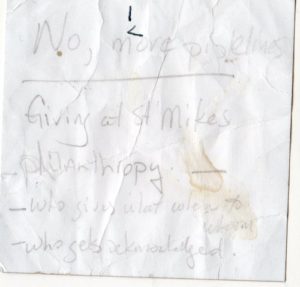Note the comma placement.
Transcription:
[in ink]
|
<
[centred over "more"]
[in pencil]
No, more pipelines
Giving at St. Mikes
philanthropy
who gives what when to
whom
who gets acknowledged .
* * * * * * *
I have been practising with delimiters in subject headers in email. I have a director who really wants people to manage the subject line (change the subject when the conversation veers into another direction). I like to keep bits of history alive. So my favourite delimiter was the angled bracket.
tangent < subject
I found that three to four of these is the max. After that it reads like a biblical begat.
I also have been getting reacquainted with Unix and have incorporated the pipe in delimiting subjects
Eclairs | Food | Baked Goods
Goal Displacement | Problem Displacement
Day of Tweets | Year of Treats
Very useful for assigning multiple subjects to one message.
And so with delimiters in mind, I revisited the lowly comma
No, more pipelines
And behold I discovered a technical term from the world of philanthropy: prospect pipelines. With a Canadian twist:
Let’s start with a definition – what exactly do we mean when we say prospect pipeline? Simply put, the prospect pipeline places cohorts of prospects at different stages of the development cycle (identification, cultivation, solicitation, stewardship) and then measures their progress as they move from an unqualified lead to a donor.
Philanthropic Trends Quarterly, 2011, Issue 1
I have in mind all the micro-donating that can build goodwill and support for a project.
Signs of a healthy pipeline:
- Active prospects at all gift levels.
- Active prospects at all stages of the development cycle (identification, cultivation, solicitation and stewardship).
- Mechanisms to feed new prospects into the pipeline.
- Means for measuring progress.
- Access to good data.
I foresee much discussion of the etiquette of panhandling.
More pipelines, yes?!
Begging to Learn | Learning to Beg
And so for day 2786
29.07.2014

